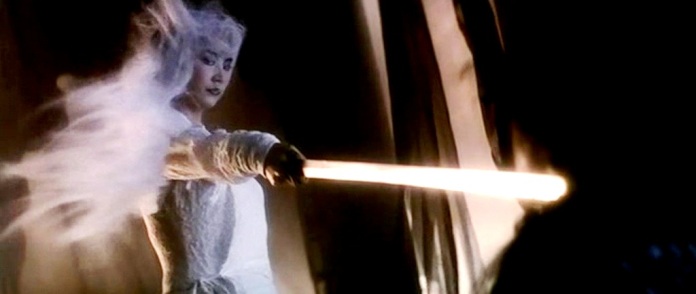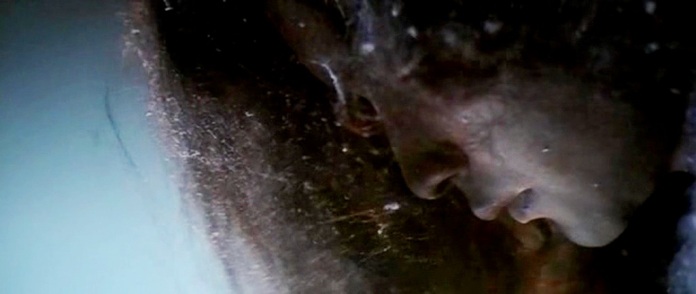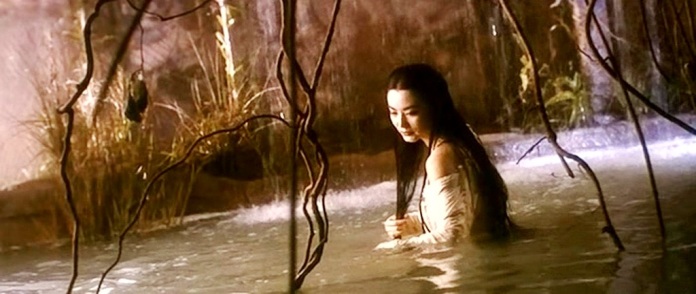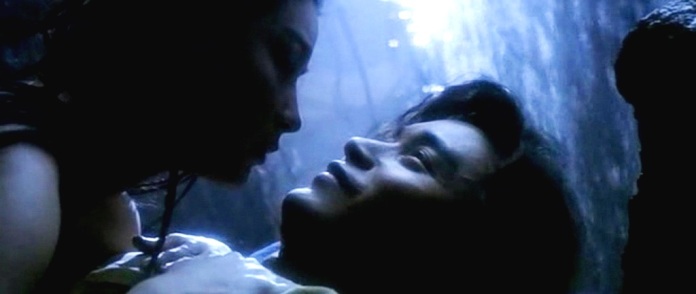Bai fa mo nu zhuan ; Bai fa mo nu zhuan II

Directors: Ronnie Yu ; David Wu
By Roderick Heath
Yusheng Liang, who died in 2009, is credited as one of the writers who modernised the wu xia novel, the imperishably popular Chinese mythological pulp genre. One of his most iconic works, The Bride with White Hair, published in 1958, has been adapted several times for the big and small screens. The most famous adaptation is the two-part epic made by Ronnie Yu and David Wu, who split directorial duties but shared writing credits on both films. Both directors parlayed their success with this movie into disappointing Hollywood careers, but The Bride with White Hair diptych is one of the most eye-catching and dramatically inventive examples of the evolving modern Hong Kong genre cinema. It was made when the classic wire-fu style defined by directors like King Hu and Tsui Hark had not yet been corrupted by CGI, but it is vividly modern in other respects.

The aesthetics of the Hong Kong genre school both recall Hollywood’s all-but-lost enthusiasm for raw storytelling and cinematic action panache, whilst retaining its own peculiarities, and The Bride with White Hair pushed the boundaries of the school. Its relatively unsheathed erotic edge and its modern thematic concerns pick at the surface the generic conceits and traditional assumptions, and present wild variations on its central issue of masculinity and femininity in fatal conflict. The Bride with White Hair’s unusual structure offers a prologue that depicts a party of Imperial soldiers travelling to a distant, enchanted mountain where they’ve heard grows a rare flower with amazing healing properties that blooms only once every 10 years. They need the flowers to cure the Emperor’s health, but when they reach the peak, they’re astounded to find a man seated in the billowing snow, watching over the flowers. He slaughters them, declaring that there is only one person the flowers are for. This guardian is Zhuo Yihang, whose life story is recounted in flashback.

Zhuo was an orphan adopted into and raised with the values and fighting techniques of the Wu-Tang clan, one of eight syndicated sects that form the Chung Yuan. Zhuo proved to be a problematic student because of his innate individualism and discomfort with a life lived according to strict hierarchies, but he was also clearly the most talented. In spite of the efforts of one of the teachers, Bai Yun (Law Lok-lam), to promote his daughter Ho Lu-Hua (Yammie Lam) as a potential chieftain for the Wu-Tang, Zhuo, after clearing himself of charges of assault and battery against some young men from rival clans, is nominated to lead a coalition of their forces against the forces of Ji Wushuang. This enemy gang is named after its leaders, conjoined male and female twins (Francis Ng and Elaine Lui) who are evil sorcerers, once expelled from China by the Chung Yuan clans. Now the twins have returned at the head of a cult of followers who practice human sacrifice and erotic rituals.

Their chief warrior and strong right fist is the whip-wielding Devil Wolf Girl (Brigitte Lin), so dubbed because she was raised from infancy by wolves and retained a devilish relish for battle after being trained in the deadly arts by Ji. But Zhuo, seeing her at war, remembers her when she was still living with the wolves and playing her pipe under the moonlight. He tracks her down after a battle to a ruined city where she bathes in a sacred spring. In spite of her fury at his intransigence, she has to return to her overlord before she can kill him. Such a sequence has echoes through to Western mythology, like the tale of Artemis and Actaeon, with its coded relationship of voyeurism and the inviolable female space. Later, when the Chung Yuan army advances into Wushuang’s territory, Lian and the cultists ambush the coalition encampment, and she and Zhuo square off. Zhuo challenges her to a weaponless fight, but Lian is struck by an arrow shot by Lu-Hua, and Zhuo protectively rushes her away to the ancient city, where he helps her recover and becomes her lover. He gives her the name Lian Nichang, and during his absence, he’s written off as a traitor by the clans. The male Ji Wushuang desperately desires Nichang, and is stoked to heights of jealousy; when she returns to the cult to ask for release so she can live with Zhuo, the male insists she sleep with him first. When she fails to please him, she’s forced to undergo a punishing ritual humiliation.

The Bride with White Hair films share common traits with Hong Kong cinema, from the style of humour and character interaction that seem distinctly more naïve than what we’re used to in Western cinema, to the fluent, utterly confident sense of storytelling that seems at once beautifully simple and irreducibly sophisticated, moving at a pace that forces the viewer to keep up. Both episodes soar to rare heights of stoked emotion and drenched décor effects, but it’s the way their inflated set-pieces revolve around metaphorical versions of everyday travails that really drives them. It’s most marked in Nichang’s singular insistence that Zhuo trust her, a key component of any adult relationship, made here to hinge on an act of mass murder and magical shape-shifting. But likewise, Zhuo’s chafing against the authoritarianism and clannish narrowness of Chung Yuan life evokes any kind of discomfort in imposed social roles.

Yu was most interested in taking a Romeo and Juliet angle on Yusheng’s novel, emphasising its heroes as struggling with the deterministic forces that have created them. Throughout the two films also flows a richly transformative investigation into extreme visions of gender conflict and emotional violence. Nichang, in particular, lives on a balancing point between transcendent epiphany and infernal rage in the first film, linked to the natural world and primal forces, whereas fellow orphan Zhuo is associated with human, hierarchical society and its entrapping concepts. But both are characterised as exceptional rebels who cause terrible destruction because of their wayward identities. In the sequel, Nichang relentlessly pummels a young woman almost to death to save her the lesson never to trust a man. The conjoined male and female villains of the first film, who, with their magic powers, can beat up people without touching them, also embody the story’s twisted take on heterosexual relations, and add immeasurably to the perversity and drama of the action. The his/her arguments between the twins, sister perpetually mocking her brother for his agonised lust for Nichang, which proves to be their Achilles’ heel, builds to the amazingly pathological images of the brother stabbing his own arm in masochistic frustration, the sister screaming and begging him to stop, and later, when he’s trying to have sex with a willfully passionless Nichang, his sister, “lying” on his back mocking him, building to eruptive frustration that causes him to smash Nichang’s head repeatedly against the bed frame. It’s the sort of scene where you wonder why David Cronenberg or Paul Verhoeven didn’t come up with it first.

Dashes of Spielbergian ambition dot The Bride with White Hair’s visual texture, with the Indian styling of Ji’s infernal cult, massed in a chanting relish of evil. With its colour-drenched frames, dramatically tilted camera angles, and the eerily beautiful, yet lightning-paced images of the warriors bounding through fog-shrouded forests, Yu, like Johnny To’s wild The Heroic Trio from the same year, effectively synthesises Hollywood high style with the traditional effects of wu xia cinema. Yu also employs a headlong rush of narrative clearly learnt from Tsui Hark, and he’s not terribly interested in developing with clarity a political subplot involving General Wu San-Kuei (Eddy Ko), an officer Zhuo had known since childhood who sets out to become Emperor, adding to a slightly diffuse quality to the narrative that is the film’s biggest fault. But the blend of fantasy imagery, and a coherent use of that imagery’s protean possibilities for investigating complex aspects of the psyche, help the film earn comparison with the classical mythology it evokes.

The blend of the utterly fantastic and the emotionally overwrought builds to two brilliant sequences. The gauntlet Nichang has to walk in leaving Ji’s cult sees her walking upon hot coals, and shards of jagged glass while being mercilessly beaten by the cultists. She emerges, bloodied and near collapse, but still manages enough pride and power to walk out. But when she returns to the ancient city, she finds Zhuo has left. Fellow members of the Wu-Tang, including Lu-Hua, have tracked him down and convinced him to return to explain himself to the head priest, but on arrival, they find the other Wu-Tang have all been massacred, the head priest’s severed head dangling from the ceiling, and one wounded man reporting that the Wolf Girl attacked them. When Nichang arrives looking for Zhuo, the remnants of the cult attack her, and even Zhuo believes she’s guilty thanks to the dying man’s testimony. Nichang is deeply offended and heartbroken at the distrust, especially after what she’s been through for Zhuo, and when Lu-Hua manages to stab her with a sword, rather than dying, she’s transmogrified into a white-haired demon. She skewers Lu-Hua with a sword, tears off her red wedding gown to reveal a white one, and slaughters the rest of the Wu-Tang in a supernatural fury. The first massacre proves to have been the work of Ji, having used their power to assume Nichang’s form, and she and Zhuo join forces long enough to slice the evil sorcerer in half, allowing the male to release a sigh of relief before dying: “Such a relief to sleep this way!”

Yu’s film concludes on a bravely unresolved note with the haunted Zhuo on his mountaintop vigil, transfixed by his failures, and Nichang having disappeared into the underworld, now a spirit of purified wrath. Wu’s follow-up takes the story well beyond the limits of Yusheng’s novel: it’s 10 years later, and Zhou continues his vigil as the time of the flower’s blooming comes near. The Wu-Tang is struggling to rebuild after the massacre, but Nichang has entirely embraced her dark side and is relentlessly killing off all the sects of the Chung Yuan. The Wu-Tang tradition has come down to its last heir, Fung Chun-Kit (Sunny Chan), who’s marrying Yu Qin or “Lyre” (Joey Mann), daughter of another clan, taking the risk of incurring Nichang’s wrathful efforts to destroy all marriages within the clan. The image of the severed Ji twins presages a theme developed here of gender war, as Nichang has become a declared misanthropist, saving wronged and dishonoured women and bringing them into her cult, including her chief henchwoman and crypto-lesbian lover Chen Yuanyuan (Ruth Winona Tao), inculcating them with powers to become ruthless killers whilst giving them each a taste of revenge on their specific male abusers. On Kit and Lyre’s wedding night, Nichang breaks into the temple and savagely beats the couple, but when one of Feng’s friends manages to help him escape, Nichang spirits Ling to her hidden fortress and brainwashes her into becoming a psychotic assassin of men. Feng is nursed back to health by tomboy Wu-Tang adherent Moon (Christy Chung), who’s in love with him and sad that he married Ling, but sets out with him and a band of other young Chung Yuan warriors to seek out and storm Nichang’s fortress.

Wu’s half of the story presents several mirroring images of both the first film’s characters and their travails: where Zhuo and Nichang’s schism was something they tried to resolve in spite of their disparate worlds, Kit and Ling’s split is artificially imposed. The original’s core love triangle is reconfigured into a proliferation of grazing, inchoate relationships. Moon pines for Kit and is admired in turn by his determined but less good-looking fellow warrior Liu Hang (Richard Suen), who proves nonetheless a determined and able helpmate. Moon, with her mannish affectations—she’s seen constantly chewing on a cigarette—but thoroughly heterosexual ambitions stand in contrast to the cult Nichang runs with her collective of female assassins and their hideout’s air of lush sensuality. The clan warriors are placed under the command of the aged “Granny” of the Au Mei clan (Lily Chung), whose own mane of white hair sees her momentarily mistaken for the witch when she comes to take command. Moon fires off arrows at her, but she’s so good, she catches the arrows between her teeth. She’s also a disarmingly unaffected, calm, and wise person who prefers acting in defence and delegates to Kit when the time to attack arrives. Nichang in her transmogrified witch state can throw out her long white hair in tentacle-like coils that pierce the skin and drip poison. Moon is riddled with strands of the hair, and she’s left on death’s door, forbidden from attempting any kung fu; but she still leaps into the fray to save her friends with tragic results.

A lot of credit for the heft of the films is owed to its terrific pairing of Cheung and Lin, two of the best actors in Hong Kong cinema (though Cheung’s contribution to the second film is disappointingly brief), and especially Lin, who commands the films like an empress. They both considerably overshadow the younger actors in the sequel. There’s a touch of tribute to John Carpenter as the languorous, suggestive sequences of Lyre being ritually subsumed into the cult by Chen Yuanyuan echo the similar scenes of heroines in Big Trouble in Little China (1986), whilst the scene in which Kit dances before his wedding, blindfolded and playing a lyre given as a wedding present, has a quality similar to the rapturous little touches with which Zhang Yimou would decorate his wu xia films. After one fight scene, Wu cuts to observe the glittering drops of a slain man’s blood drip from the fronds of a silvery bush, a poetic flourish of a kind that dots both films, and it’s worth noting the intensity of the design element to the films, with the great costume design by Emi Wada and the set decoration, especially in the recurring contrast between the livid whiteness of Nichang and setting rendered either in red, the same as the red blood that spits out of so many bodies, or rich nocturnal blue. Wu, a long-time editor who also served in that capacity on the first episode, offers direction slightly more prosaic than Yu’s, and the initial Seven Samurai-like story set-up more familiar, failing to ruffle the settled rhythms and naïve humour of the genre as much.

But the story arc again echoes with fidelity a familiar mythic tale, and proceeds with wildly eccentric energy, building to even more floridly grandiose climaxes. When the Chung Yuan war party is all but wiped out infiltrating Nichang’s citadel, Kit and Liu are advised by Granny to seek out Zhuo Yuhang, as she’s one of the few who knows where’s he’s been hiding all these years. Wu obfuscates whether they find him in the chilly extremes of the sacred mountain, cutting from them stumbling away in a blizzard with Zhou watching them from his pinnacle, to the determined young duo deciding to attack the fortress again with planted explosives. It’s in the last few minutes that Wu’s installment goes for broke as his heroes give battle, Lei dying in combat with one of female cultists, dynamiting both himself and her after giving her a kiss to show her what a “real man” is like, and Zhuo turning up in time to forestall Nichang from killing Kit and Lyre. The confrontation of the two former lovers, long delayed, pays off in the delirious image of Zhuo, once again dropping his arms before Nichang, being skewered by her long tendrils of hair, proffering the magical flowers that get burnt to a crisp by a falling cinder. Zhuo’s proof of his still-smouldering ardour and contrition brings Nichang back from a homicidal rage, only to gain a sword in the back from the jealous Chen Yuanyuan, and all three die as the fortress falls flaming about their ears. It’s the sort of giddy, Wagnerian climax that one so often expects from fantasy-action tales, but so rarely gets.

The Bride with White Hair is one of my very favorite HK movies. Just reading this makes me want to rush home and put my laserdisc in the player so I can groove on Brigitte Lin’s lacerating stare for a while.
LikeLike
Hi, Christianne; well said. Lin’s eyebrows slash deeper than any sword.
LikeLike
“Dashes of Spielbergian ambition dot The Bride with White Hair’s visual texture, with the Indian styling of Ji’s infernal cult, massed in a chanting relish of evil, suggesting the influence of Indiana Jones and the Temple of Doom (1984), as well as a hint of Bollywood flavouring. But with its colour-drenched frames, dramatically tilted camera angles, and the eerily beautiful, yet lightning-paced images of the warriors bounding through fog-shrouded forests, Yu, like Johnny To’s wild The Heroic Trio from the same year, effectively synthesises Hollywood high style with the traditional effects of wu xia cinema. ”
Most fascinating Rod. Although my site collague just included these films among his top 3,000 films of all-time, I must say I have never seen them, and up till now have been ill informed on their worthiness. This is another remarkable essay that nonetheless engages whether or not said subject has been negotiated. The giddy Wagnerian climax is also most intriguing. I’ll get to this for sure in the near future.
LikeLike
Well, Sam, I hope you do get around to watching these; they would certainly make my top 11,237 films of all time.
LikeLike